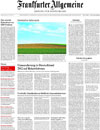
A total of 1.08 million people, including 966,000 foreigners, moved to Germany in 2012. The highest figure since 1995, reports Frankfurter Allgemeine Zeitung, which headlines with “Immigration to Germany reaches record level in 2012”.
According to the Federal Statistical Office, immigration increased by 13 per cent when compared to 2011. Most of the immigrants were from Poland, Romania and Bulgaria.
German authorities expressed their delight with the figures: “This influx represents an enormous opportunity for everyone concerned, because the new wave of immigrants is younger and better trained,” declared the Minister of Labour, Ursula von der Leyen.
In spite of the numbers arriving in the country, tens of thousands of vacancies, notably in the healthcare sector, have yet to be filled. Frankfurter Allgemeine Zeitung explains that the shortfall will soon be addressed by “new employment regulations, set to come into force on July 1, which will facilitate the immigration of specialised workers,” and also open the labour market to non-EU citizens.
The countries of central and eastern Europe, as well as southern European states hard hit by the crisis, are the major sources for migrant labour in Germany. As El País explains —
… the bulk of today’s migrants come from eastern Europe. But the largest upsurge is in the numbers arriving from countries affected by the euro crisis: notably Spain (31,145 in 2012), Greece (34,109) and Portugal (11,762). […] The main countries of origin from within the EU are Poland (176,000), followed by Romania (116,000) and Bulgaria (59,000).
Italy is not far behind: more than 42,000 Italians emigrated to Germany last year, notes Il Manifesto, whose front page compares Germany to “Lamerica”, the America that inspired the dreams of late 19th Century emigrants. According to the communist daily the influx —
… is an advantage for Germany, which has a declining population and needs to renew its workforce. However, for the countries of the South, which spend on the education of the young graduates who make up the bulk of the migrants, it represents a loss.
This success is largely due to the efficiency of the German Federal Employment Agency, explains Mediapart —
… the Bundesagentur für Arbeit publishes hundreds of thousands of vacancies on its website, which is accessible in several languages. It also seeks out workers on foreign labour markets, which have been devastated, and organises delocalised job centres.
However, the French news website notes —
Access to the new Eldorado requires a certain effort [...] Along with a mastery of the language, which is indispensable for those in search of skilled jobs, there are other obstacles to moving to the country […]: the non-recognition of certain qualifications, the fact that many employers, and in particular SMEs, are reticent about recruiting foreigners, and administrative barriers for low-skilled jobs. The reality can even prove to be disappointing, in particular for the many graduates of universities in southern countries, who have to put up with precarious part-time work and the absence of recognition for their degrees.
Was this article useful? If so we are delighted!
It is freely available because we believe that the right to free and independent information is essential for democracy. But this right is not guaranteed forever, and independence comes at a cost. We need your support in order to continue publishing independent, multilingual news for all Europeans.
Discover our subscription offers and their exclusive benefits and become a member of our community now!











